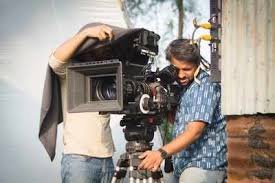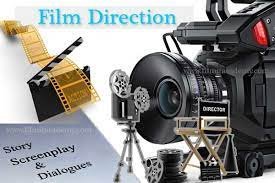What is Short Term Film Direction Courses Best Course ? Diploma in Film Direction
Short-term Film Direction Courses are educational programs that provide students with a condensed learning experience focused on the fundamentals of film directing. These courses are designed to equip aspiring filmmakers with the essential skills, knowledge, and techniques required to create a successful film project.
These courses can vary in length, ranging from a few weeks to a few months, and are typically offered by film schools, universities, and independent organizations. They offer a flexible learning option for students who are unable to commit to long-term programs due to time or financial constraints.

Short-term Film Direction Courses generally cover the following topics:
- Script Analysis and Storytelling: A fundamental component of filmmaking is the ability to tell a compelling story. Short-term film direction courses teach students how to analyze scripts and develop the visual language required to bring a story to life on the screen.
- Shot Composition and Camera Techniques: A crucial part of film direction is creating visually engaging shots that capture the audience’s attention. Short-term film direction courses cover the principles of shot composition and camera techniques that can be used to convey meaning and emotion.
- Directing Actors: Actors play a vital role in bringing a film to life, and directors need to be able to communicate their vision effectively to their cast. Short-term film direction courses teach students how to work with actors and guide them to deliver performances that are true to the character and the story.
- Pre-Production Planning: Planning is an essential part of filmmaking. Short-term film direction courses teach students how to plan a film project, including creating a shooting schedule, casting, location scouting, and budgeting.
- Collaboration and Communication: Directors need to work closely with the rest of the film crew to create a successful project. Short-term film direction courses teach students the importance of effective communication, leadership, and team management skills that are critical for leading a film production team.
- Post-Production Techniques: Once the filming is complete, the film goes through a post-production process where it is edited and polished. Short-term film direction courses cover the principles of editing, sound design, and other post-production techniques that are essential for creating a cohesive visual narrative.
Benefits of Short-term Film Direction Courses:
- Quick Learning Experience: Short-term film direction courses provide students with a condensed learning experience, allowing them to gain the essential skills and knowledge required to create a successful film project in a short amount of time.
- Cost-Effective: Short-term film direction courses are generally more affordable than longer courses, making them an excellent option for students who have a limited budget.
- Flexibility: Short-term film direction courses offer students the flexibility to fit their learning around their other commitments, allowing them to gain the knowledge and skills required to pursue their passion for filmmaking without disrupting their schedule.

In conclusion, Short-term Film Direction Courses provide an excellent opportunity for aspiring filmmakers to gain the essential skills and knowledge required to create a successful film project. These courses are flexible, cost-effective, and provide a quick learning experience, making them an excellent option for students who have a passion for filmmaking but are unable to commit to long-term programs.
Diploma in Film Direction:
A Diploma in Film Direction is a comprehensive program designed to equip students with the knowledge, skills, and techniques required to become successful film directors. This program generally takes two to three years to complete and is offered by various film schools and universities across India.
The curriculum of the Diploma in Film Direction program typically includes both theoretical and practical components. The theoretical component of the program covers the history of cinema, scriptwriting, film analysis, and film theory. The practical component of the program covers various aspects of film production, including cinematography, sound design, editing, and production management.

Here are some of the core subjects covered in a Diploma in Film Direction program:
- Screenplay Writing: Screenplay writing is an essential part of film direction. Students in a Diploma in Film Direction program learn how to write engaging and compelling screenplays that can be translated onto the screen.
- Directing: The core of the Diploma in Film Direction program is film direction. Students learn how to direct actors, manage the production process, and make critical creative decisions that impact the overall outcome of a film project.
- Cinematography: Cinematography involves the art of capturing visual imagery for a film project. In a Diploma in Film Direction program, students learn how to use cameras, lighting, and composition to create visually compelling shots that convey the desired emotional impact.
- Editing: Editing is the process of selecting and sequencing raw footage to create a coherent visual narrative. Students in a Diploma in Film Direction program learn how to use editing software, create effective transitions, and manage the pacing and rhythm of a film.
- Sound Design: Sound design involves creating the sound effects and music that accompany the visual elements of a film. In a Diploma in Film Direction program, students learn how to use sound design to create mood, emotion, and tension in a film.
- Production Management: Film production involves coordinating multiple elements such as cast, crew, location, and equipment. In a Diploma in Film Direction program, students learn how to manage these elements effectively to ensure a successful and efficient film production.
The Benefits of a Diploma in Film Direction:
- Comprehensive Learning Experience: A Diploma in Film Direction program offers a comprehensive learning experience, covering all aspects of film production from concept to post-production.
- Industry-Relevant Curriculum: The curriculum of a Diploma in Film Direction program is designed to be relevant to the film industry, ensuring that graduates have the skills and knowledge required to pursue a career in filmmaking.
- Networking Opportunities: Film schools and universities often offer networking opportunities that can be valuable for students looking to make connections in the film industry.
- Access to Equipment and Resources: Diploma in Film Direction programs often provide students with access to film equipment and resources that can be expensive to acquire on their own, allowing them to gain practical experience without incurring significant costs.
- Professional Development: A Diploma in Film Direction program can provide students with a platform to develop their creative skills and gain practical experience in a collaborative environment.

In conclusion, a Diploma in Film Direction is a comprehensive program that provides students with the knowledge, skills, and techniques required to pursue a career in filmmaking. This program covers all aspects of film production and provides students with valuable networking opportunities, access to equipment and resources, and the chance to develop their professional skills.
Short-term Film Direction Courses are educational programs that provide students with a condensed learning experience focused on the fundamentals of film directing. These courses are designed to equip aspiring filmmakers with the essential skills, knowledge, and techniques required to create a successful film project.
These courses can vary in length, ranging from a few weeks to a few months, and are typically offered by film schools, universities, and independent organizations. They offer a flexible learning option for students who are unable to commit to long-term programs due to time or financial constraints.

Short-term Film Direction Courses generally cover the following topics:
- Script Analysis and Storytelling: A fundamental component of filmmaking is the ability to tell a compelling story. Short-term film direction courses teach students how to analyze scripts and develop the visual language required to bring a story to life on the screen.
- Shot Composition and Camera Techniques: A crucial part of film direction is creating visually engaging shots that capture the audience’s attention. Short-term film direction courses cover the principles of shot composition and camera techniques that can be used to convey meaning and emotion.
- Directing Actors: Actors play a vital role in bringing a film to life, and directors need to be able to communicate their vision effectively to their cast. Short-term film direction courses teach students how to work with actors and guide them to deliver performances that are true to the character and the story.
- Pre-Production Planning: Planning is an essential part of filmmaking. Short-term film direction courses teach students how to plan a film project, including creating a shooting schedule, casting, location scouting, and budgeting.
- Collaboration and Communication: Directors need to work closely with the rest of the film crew to create a successful project. Short-term film direction courses teach students the importance of effective communication, leadership, and team management skills that are critical for leading a film production team.
- Post-Production Techniques: Once the filming is complete, the film goes through a post-production process where it is edited and polished. Short-term film direction courses cover the principles of editing, sound design, and other post-production techniques that are essential for creating a cohesive visual narrative.
Benefits of Short-term Film Direction Courses:
- Quick Learning Experience: Short-term film direction courses provide students with a condensed learning experience, allowing them to gain the essential skills and knowledge required to create a successful film project in a short amount of time.
- Cost-Effective: Short-term film direction courses are generally more affordable than longer courses, making them an excellent option for students who have a limited budget.
- Flexibility: Short-term film direction courses offer students the flexibility to fit their learning around their other commitments, allowing them to gain the knowledge and skills required to pursue their passion for filmmaking without disrupting their schedule.

In conclusion, Short-term Film Direction Courses provide an excellent opportunity for aspiring filmmakers to gain the essential skills and knowledge required to create a successful film project. These courses are flexible, cost-effective, and provide a quick learning experience, making them an excellent option for students who have a passion for filmmaking but are unable to commit to long-term programs.
Diploma in Film Direction:
A Diploma in Film Direction is a comprehensive program designed to equip students with the knowledge, skills, and techniques required to become successful film directors. This program generally takes two to three years to complete and is offered by various film schools and universities across India.
The curriculum of the Diploma in Film Direction program typically includes both theoretical and practical components. The theoretical component of the program covers the history of cinema, scriptwriting, film analysis, and film theory. The practical component of the program covers various aspects of film production, including cinematography, sound design, editing, and production management.

Here are some of the core subjects covered in a Diploma in Film Direction program:
- Screenplay Writing: Screenplay writing is an essential part of film direction. Students in a Diploma in Film Direction program learn how to write engaging and compelling screenplays that can be translated onto the screen.
- Directing: The core of the Diploma in Film Direction program is film direction. Students learn how to direct actors, manage the production process, and make critical creative decisions that impact the overall outcome of a film project.
- Cinematography: Cinematography involves the art of capturing visual imagery for a film project. In a Diploma in Film Direction program, students learn how to use cameras, lighting, and composition to create visually compelling shots that convey the desired emotional impact.
- Editing: Editing is the process of selecting and sequencing raw footage to create a coherent visual narrative. Students in a Diploma in Film Direction program learn how to use editing software, create effective transitions, and manage the pacing and rhythm of a film.
- Sound Design: Sound design involves creating the sound effects and music that accompany the visual elements of a film. In a Diploma in Film Direction program, students learn how to use sound design to create mood, emotion, and tension in a film.
- Production Management: Film production involves coordinating multiple elements such as cast, crew, location, and equipment. In a Diploma in Film Direction program, students learn how to manage these elements effectively to ensure a successful and efficient film production.
The Benefits of a Diploma in Film Direction:
- Comprehensive Learning Experience: A Diploma in Film Direction program offers a comprehensive learning experience, covering all aspects of film production from concept to post-production.
- Industry-Relevant Curriculum: The curriculum of a Diploma in Film Direction program is designed to be relevant to the film industry, ensuring that graduates have the skills and knowledge required to pursue a career in filmmaking.
- Networking Opportunities: Film schools and universities often offer networking opportunities that can be valuable for students looking to make connections in the film industry.
- Access to Equipment and Resources: Diploma in Film Direction programs often provide students with access to film equipment and resources that can be expensive to acquire on their own, allowing them to gain practical experience without incurring significant costs.
- Professional Development: A Diploma in Film Direction program can provide students with a platform to develop their creative skills and gain practical experience in a collaborative environment.

In conclusion, a Diploma in Film Direction is a comprehensive program that provides students with the knowledge, skills, and techniques required to pursue a career in filmmaking. This program covers all aspects of film production and provides students with valuable networking opportunities, access to equipment and resources, and the chance to develop their professional skills.
Short-term Film Direction Courses are educational programs that provide students with a condensed learning experience focused on the fundamentals of film directing. These courses are designed to equip aspiring filmmakers with the essential skills, knowledge, and techniques required to create a successful film project.
These courses can vary in length, ranging from a few weeks to a few months, and are typically offered by film schools, universities, and independent organizations. They offer a flexible learning option for students who are unable to commit to long-term programs due to time or financial constraints.

Short-term Film Direction Courses generally cover the following topics:
- Script Analysis and Storytelling: A fundamental component of filmmaking is the ability to tell a compelling story. Short-term film direction courses teach students how to analyze scripts and develop the visual language required to bring a story to life on the screen.
- Shot Composition and Camera Techniques: A crucial part of film direction is creating visually engaging shots that capture the audience’s attention. Short-term film direction courses cover the principles of shot composition and camera techniques that can be used to convey meaning and emotion.
- Directing Actors: Actors play a vital role in bringing a film to life, and directors need to be able to communicate their vision effectively to their cast. Short-term film direction courses teach students how to work with actors and guide them to deliver performances that are true to the character and the story.
- Pre-Production Planning: Planning is an essential part of filmmaking. Short-term film direction courses teach students how to plan a film project, including creating a shooting schedule, casting, location scouting, and budgeting.
- Collaboration and Communication: Directors need to work closely with the rest of the film crew to create a successful project. Short-term film direction courses teach students the importance of effective communication, leadership, and team management skills that are critical for leading a film production team.
- Post-Production Techniques: Once the filming is complete, the film goes through a post-production process where it is edited and polished. Short-term film direction courses cover the principles of editing, sound design, and other post-production techniques that are essential for creating a cohesive visual narrative.
Benefits of Short-term Film Direction Courses:
- Quick Learning Experience: Short-term film direction courses provide students with a condensed learning experience, allowing them to gain the essential skills and knowledge required to create a successful film project in a short amount of time.
- Cost-Effective: Short-term film direction courses are generally more affordable than longer courses, making them an excellent option for students who have a limited budget.
- Flexibility: Short-term film direction courses offer students the flexibility to fit their learning around their other commitments, allowing them to gain the knowledge and skills required to pursue their passion for filmmaking without disrupting their schedule.

In conclusion, Short-term Film Direction Courses provide an excellent opportunity for aspiring filmmakers to gain the essential skills and knowledge required to create a successful film project. These courses are flexible, cost-effective, and provide a quick learning experience, making them an excellent option for students who have a passion for filmmaking but are unable to commit to long-term programs.
Diploma in Film Direction:
A Diploma in Film Direction is a comprehensive program designed to equip students with the knowledge, skills, and techniques required to become successful film directors. This program generally takes two to three years to complete and is offered by various film schools and universities across India.
The curriculum of the Diploma in Film Direction program typically includes both theoretical and practical components. The theoretical component of the program covers the history of cinema, scriptwriting, film analysis, and film theory. The practical component of the program covers various aspects of film production, including cinematography, sound design, editing, and production management.

Here are some of the core subjects covered in a Diploma in Film Direction program:
- Screenplay Writing: Screenplay writing is an essential part of film direction. Students in a Diploma in Film Direction program learn how to write engaging and compelling screenplays that can be translated onto the screen.
- Directing: The core of the Diploma in Film Direction program is film direction. Students learn how to direct actors, manage the production process, and make critical creative decisions that impact the overall outcome of a film project.
- Cinematography: Cinematography involves the art of capturing visual imagery for a film project. In a Diploma in Film Direction program, students learn how to use cameras, lighting, and composition to create visually compelling shots that convey the desired emotional impact.
- Editing: Editing is the process of selecting and sequencing raw footage to create a coherent visual narrative. Students in a Diploma in Film Direction program learn how to use editing software, create effective transitions, and manage the pacing and rhythm of a film.
- Sound Design: Sound design involves creating the sound effects and music that accompany the visual elements of a film. In a Diploma in Film Direction program, students learn how to use sound design to create mood, emotion, and tension in a film.
- Production Management: Film production involves coordinating multiple elements such as cast, crew, location, and equipment. In a Diploma in Film Direction program, students learn how to manage these elements effectively to ensure a successful and efficient film production.
The Benefits of a Diploma in Film Direction:
- Comprehensive Learning Experience: A Diploma in Film Direction program offers a comprehensive learning experience, covering all aspects of film production from concept to post-production.
- Industry-Relevant Curriculum: The curriculum of a Diploma in Film Direction program is designed to be relevant to the film industry, ensuring that graduates have the skills and knowledge required to pursue a career in filmmaking.
- Networking Opportunities: Film schools and universities often offer networking opportunities that can be valuable for students looking to make connections in the film industry.
- Access to Equipment and Resources: Diploma in Film Direction programs often provide students with access to film equipment and resources that can be expensive to acquire on their own, allowing them to gain practical experience without incurring significant costs.
- Professional Development: A Diploma in Film Direction program can provide students with a platform to develop their creative skills and gain practical experience in a collaborative environment.

In conclusion, a Diploma in Film Direction is a comprehensive program that provides students with the knowledge, skills, and techniques required to pursue a career in filmmaking. This program covers all aspects of film production and provides students with valuable networking opportunities, access to equipment and resources, and the chance to develop their professional skills.







